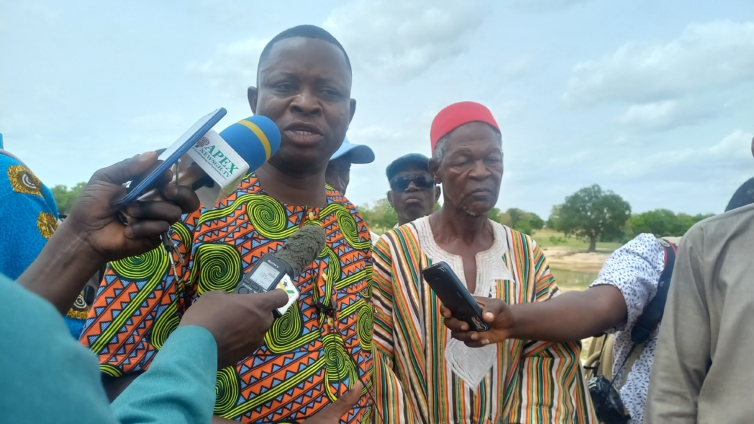The government spent GH₵201,113,875 of the petroleum revenue to construct 285 dams under the flagship programme, One Village One Dam (1V1D) policy, research has revealed.
The research showed that averagely, the government spent GH₵670,350 on each dam, an amount far higher than the GH₵250,000.00 stated by the government and sighted in the contract award letters.
It also uncovered that GH₵10,064,250 of the Annual Budget Funding Amount was spent on paying consultancy services for construction supervision of the dams, while payment for construction of some dams exceeded the contract sums.
The research was conducted by the Northern Patriots in Research and Advocacy (NORPRA), a Convener of the Northern Coalition of Civil Society Organisations with funding support from the Africa Center for Energy Policy (ACEP) as part of expenditure and performance tracking of the dams.
The findings dubbed; 'Ghana’s Oil Money on Dried Dams' was made known to stakeholders in Bolgatanga in the Upper East Region.
The research's purpose was to ascertain whether the dams constructed in the five regions of the north under the 1V1D policy were supporting all year-round irrigation activities as intended and the amount spent on them.
The Executive Director of NORPRA, Mr Bismarck Adongo Ayorogo who presented the findings, noted that although many of the dams were completed, they were not serving the intended purpose of supporting farmers to engage in dry season farming.
Mr Ayorogo noted that all the dams visited had dried up and farmers could not practice irrigation farming.
“The community members who participated in the focused group discussion and backed with community scorecards said the dams did not contribute to anything, and when we visited the dams, almost all the dams were dried up, no single dam was functioning or having water and there was no dry season farming around any of the dams,” he said.
The findings also established that no audit report on the 1V1D projects was found even though the government had stated in the 2018 Budget Statement and Economic Policies that the Audit Service was increasing its audit coverage on 1V1D to ascertain value for money.
It also revealed that the Ghana Irrigation Development Authority (GIDA), with institutional capacity of dam construction did not lead in the design, construction, and supervision of the 1V1D projects, and the community members were also not involved or consulted, and that contributed to the poor implementation of the policy.
The findings, therefore, recommended that there should be an audit into the 1V1D dams, while reviewing the policy and including the GIDA and the Ministry of Food and Agriculture to ensure that dams were properly constructed to meet the objectives of increasing food security, reducing poverty and creating jobs.
The government through the then Ministry of Special Development Initiatives in 2018 constructed earth dams as part of the pro-poor policies under the Infrastructure for Poverty Eradication Programme (IPEP) to address regional imbalances, increase food security and jobs creation.
Mr Ayorogo expressed disappointment at the failed policy and called for attention to be given to revamping existing dams that were already supporting farmers to practice dry season farming.
Latest Stories
-
SIC Insurance PLC pays over $1m non-motor insurance claim to VRA
5 minutes -
COCOBOD now under Finance Ministry’s oversight – Ato Forson
42 minutes -
Sudan’s war: Violations and repercussions
42 minutes -
‘Even though I am NPP, monies for the National Cathedral must be investigated’ – Dr Amoah
52 minutes -
We urgently need victories to make 2026 World Cup – Otto Addo
52 minutes -
Mahama’s lean government spending extra billions is simply to create ‘loot and chop’ – Ntim Fordjour
55 minutes -
Ghana needs $800m in fuel to sustain thermal power generation – Energy and Green Transition Minister
56 minutes -
Don’t remove Dampare – Musa Dankwa advises Mahama
1 hour -
Bawku conflict: Gunmen kill level 400 student in Gambaga
1 hour -
Nursing trainees applaud the gov’ts decision to maintain trainee allowance policy
2 hours -
Obeng Empire Limited awarded for being the ‘best in ethical service and client relationship’
2 hours -
Government’s budget on education promising — Eduwatch Africa
2 hours -
Joselyn Dumas not appointed to any position – Felix Kwakye Ofosu clarifies
2 hours -
NUGS celebrates GETFund uncapping, calls for sustainable funding for free SHS
3 hours -
Today’s Front pages: Thursday, March 13, 2025
3 hours

